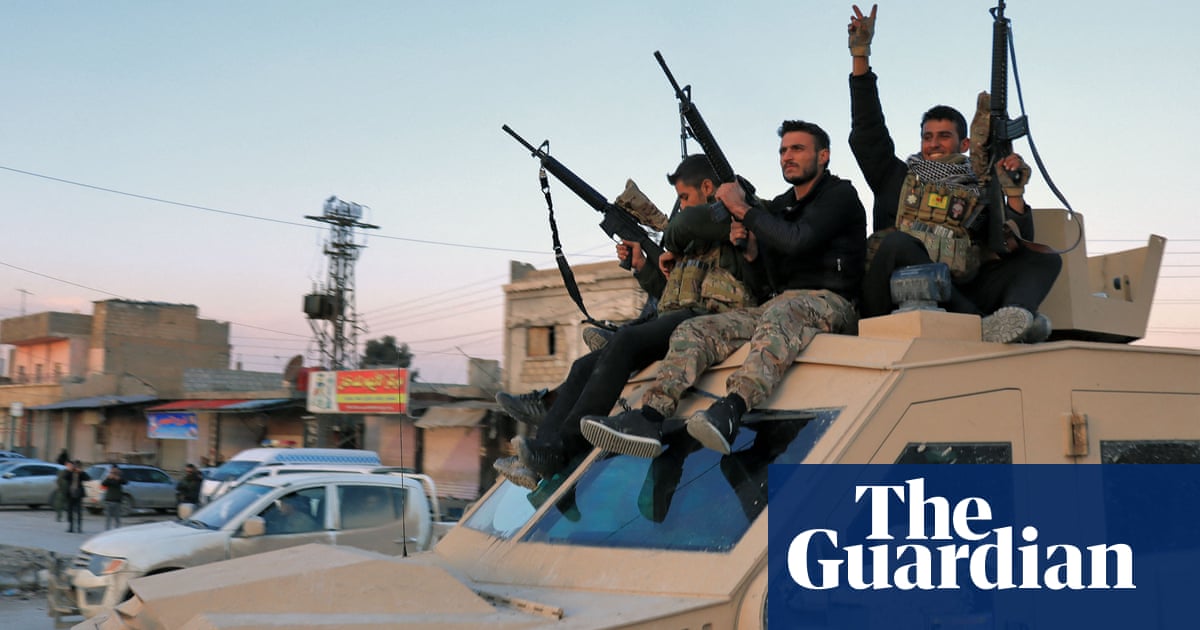
Up to 2,000 Islamic State inmates who had overrun a Syrian prison have surrendered to their Kurdish captors, ending a six-day siege that marked the terror group’s most dramatic stand since the collapse of its so-called caliphate nearly three years ago.
The peaceful finale to the standoff on Wednesday was at odds with its bloody beginnings when up to 100 extremists tried to storm the facility in the northern city of Hasakah and free those jailed inside. The raid on Thursday night, which was led by two suicide bombers, led to days of intense clashes, which claimed the lives of close to 40 members of the Syrian Democratic Forces and about 30 jihadists, and forced more than 50,000 civilians to flee.
It also drew attention to the fate of up to 700 boys and youths, who had been kept in a wing of the prison. Their condition was not initially clear, but there were no reports of further violence or deaths after alarm was raised for their safety on Monday after several US airstrikes and intensive gunfire.
IS members are rounded up in Ghwayran prison in Hassakeh, northeastern Syria. Photograph: Ahmed Mardnli/EPA
Ahead of the surrender, global concern had continued to mount. “These children should never have been held in military detention in the first place,” said the Unicef executive director, Henrietta Fore. “The violence they are subjected to may amount to war crimes.”
The UN said most of the children in the prison were Syrian and Iraqis, many of them orphans. However, the rest were made up of 20 other nationalities and their continued incarceration once again raised demands that they be repatriated. “None of them has been charged with any crime under national or international law,” said Fore. “The children of foreign nationals have received little to no support from their home countries.”
After the surrender, the SDF posted photographs of rows of men standing outside the walls of the prison, many dressed in the distinctive orange overalls worn by alleged terrorists in prisons on both sides of the Euphrates.
In Hasakah, there was widespread relief among locals who had initially feared that the storming of the prison had freed hundreds of extremists
“Now they are saying that it’s over, we hope this is the end so we can start our normal life again,” said Fawaz al Aswad, 35, from the Azizia area. “During this past week we were not afraid of gunfire but we were afraid of Isis sleeper cells. No one got hurt from my family, but one of my neighbours died. He was an SDF fighter.”
A Syrian girl stands by a tent at a camp for displaced people. Photograph: Rami Al Sayed/AFP/Getty Images
“We could hear gunfire all the time,” said Hala Muhammed, 31. “We were very afraid. If all countries have taken their Isis fighter(s) back now this would not happen. But it seems they want Isis to remain here for the time being.”
Meanwhile, in north-western Syria a disturbance of a different kind – a savage winter storm – continues to cause disruption, with heavy snow and strong winds damaging thousands of tents used by the more than 1.5 million refugees in the province. NGOs have stepped up campaigns for funding for blankets and heating as the storm that brought deep snow to Istanbul and plunging temperatures from northern Iraq to Gaza continued to rage.
The Syrian American Medical Society (SAMS) said that at least 545 tents have been reported destroyed and 9,125 tents damaged by snowfall, floods and winds. “The snow, freezing rain, and sub-zero temperatures are especially harmful to children, the elderly, and people with disabilities living in flimsy tents without insulation, adequate winter clothing, and heat,” it said in a statement.
One group of aid workers, the Molham Team, recently raised more than $1m in less than two days to rehouse 250 families in Syria’s north-west from tents into houses. The appeal, with the Twitter hashtag #untilthelasttent, initially aimed to raise $500,000 and help 100 families, but double that amount was donated, and the group was able to rehouse the entire camp.
Additional reporting by Nechirvan Mando







